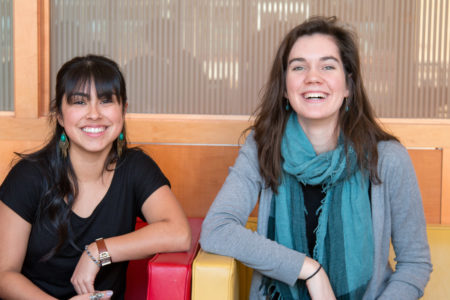By Lily Seibert
seibertl@grinnell.edu
Last spring, the College launched a Peer Organizational Mentoring program, currently staffed by Juliet Torres ‘19 and Jane Jordan ‘18. The program, funded by an Arthur Vining Davis grant, aims to help students with a variety of academic struggles ranging from procrastination to navigating extracurricular activities. Several students have already made use of the guidance and advice that the mentors offer.
“I’ve used academic support services on campus before and I felt like I understood how to navigate that system to help other people,” said Jordan.
Both mentors went through a lengthy application process that included participating in three interviews, providing a resume and cover letter and displaying their own study habits. Since then, they have noticed certain patterns associated with the kinds of questions they get most frequently and which methods of assisting students have been effective.
“The majority of the people I worked with last semester were first years who just needed help with knowing what type of resources there were…I reassured them that it is a hard transition into college, but these are now things you have to consider: time management, how to read, how to write. A lot of that stuff isn’t really

enforced in high school as much as college,” Torres said.
Often though, the component of emotional support becomes just as important as concrete study advice.
“A lot of the time it’s just nice to have someone to talk to about it…and people often, in my experience, will figure out in talking about it what the next steps are for them with often very little prompting from me. There’s a certain amount of stigma attached with struggling academically, so having this resource is huge,” Jordan said.
While some students stop by only once to ask a minor question, others have made regular appointments with the mentors and developed relationships. In particular, Torres worked with a first year who was nervous to attend office hours. For multiple weeks, they discussed strategies and proper etiquette for confidently approaching a professor.
“We talked about how to introduce yourself, what to talk about, also the benefits of talking to your professor. You feel a lot more comfortable in the class … No matter how extroverted you are, it can be really intimidating to go in and talk to your professor,” Torres said.
Working towards the future of the program, the mentors plan on spreading the word regarding their presence on campus as well as on the work they do to help others. In order to accomplish this goal, they will plan study breaks as well as increase their presence on social media.
Additionally, they will begin a partnership with a program connected to academic advising that supports first years struggling academically. In the meantime, the mentors continue to make a difference through their opportunity to help fellow students with organizational difficulties.
“Our position exists with paid professional staff, but I think it’s really unique to have students providing this kind of resource,” Jordan said.




























































